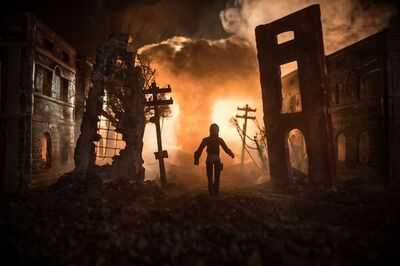
Three nuclear weapons experts have revealed the one film they believe captures the true horror of the doomsday devices. Anxiety over the distant but real risk of nuclear Armageddon has been part of the human consciousness since the Cold War, when tensions between the United States and the Soviet Union (for a time, the only two nuclear powers) were at a breaking point.
Today, several other nations, including Britain, France, China, and others, have arsenals of their own, and the unthinkable nightmare of a modern-day launch - whether it be through malice or miscommunication - continues to inspire countless films, TV programmes and video games. Oscar-winning director Kathryn Bigelow's new film, A House of Dynamite, dramatises the breathless minutes that follow the launch of an intercontinental ballistic missile (which may be nuclear) towards the US by an unknown adversary.

It's one of many movies that explores the monstrously-destructive capability of nukes, and the zero-sum game that a so-called "nuclear exchange" actually is.
In a bid to determine which of these films truly captures the sobering subject matter effectively, Express.co.uk spoke to experts in the field-and one movie stood out.
Dr Mark Hillborne, senior lecturer in the Defence Studies Department at King's College London, was one of two experts who chose a low-budget British film from the mid-1980s.
"For me, it is the BBC's Threads," he said. "Despite it being made some time ago, with special effects limited by the technology of the day, it is the most realistic and bleak portrayal of nuclear war."
The television film, which was first broadcast in 1984, is set in Yorkshire and follows ordinary families as a fictional hot war between the United States and the Soviet Union escalates.
Its uncannily realistic depiction of sirens wailing over Sheffield streets and homes reduced to rubble by nuclear shockwaves was never forgotten by those who saw it at the time, and it remains a chilling watch to this day.

A comment on a trailer for the film on YouTube reads simply: "Grew up in Sheffield. They made us watch this at school. Basically sh** myself."
"I think it had quite a traumatising effect when it was first broadcast, and indeed, I watched it recently when Russia ramped up the nuclear sabre rattling, and found it unnerving," Dr Hillborne said.
Dr Rhys Crilley, Lecturer in International Relations at Glasgow University and author of Unparalleled Catastrophe: Life and Death in the Third Nuclear Age, also singled out the film, saying it "really captures the chaos, the horror, and the terrible impact that nuclear war would have on normal people".
The makers of the gritty hit Netflix drama Adolescence are reportedly developing a series based on it, and Dr Crilley says he hopes it will "spark a bit more public discussion about the dangers of nuclear weapons and what states should do to reduce risks and disarm".
An American TV movie, The Day After, premiered the year before Threads with a similar scenario, but set in Kansas.
The academic said in the 1980s these TV films were "really significant in shaping public awareness and opinion about nuclear weapons - President Reagan even wrote in his diary that watching The Day After left him 'greatly depressed' and he soon committed to serious negotiation for nuclear arms control and reductions with his Soviet counterpart".
Dr Crilley said he really enjoyed A House of Dynamite, starring Idris Elba as the US President in the unenviable position of having to respond to a potentially nuclear attack, "despite it being a stressful and anxiety-inducing watch".
"The film effectively showed how uncertainty, confusion, and miscalculation are important factors in a nuclear crisis, and the fast pace showed that in the event of an early warning alert of an incoming nuclear attack, decision-makers have minutes to decide what to do," he added.
"It also accurately showed how many of the technologies that will supposedly keep us safe (such as early warning sensors and missile defence technologies) are actually not 100% fail-safe."
Meanwhile, James Acton, co-director of the Nuclear Policy Program at the Carnegie Endowment for International Peace, picked Dr Strangelove (1964), a black comedy that parodies the paranoia of the Cold War and the incompetence of global leaders.
The film, starring Peter Sellers in three different roles, focuses on desperate - and fictional - attempts by the US to avert all-out nuclear war after a mentally unstable general orders a pre-emptive strike on the Soviet Union without authorisation.
"It's a comedy, sure, but perfectly captures the thinking that risks causing a nuclear war," Acton said.
You may also like

NBA trade rumors: Los Angeles Lakers could sign $54 million Dallas Mavericks superstar in a bold move to strengthen roster around Luka Doncic

AIIMS Bhubaneswar provides platform for innovative health-tech Ideas

'Captivating' war series that is 'tough to watch' has 100% rating on Rotten Tomatoes

Princess Kate sends 'secret message' to Prince William with 'bold' gesture

Why has ECI yet to disclose male, female voter turnout in first phase: Tejashwi Yadav







